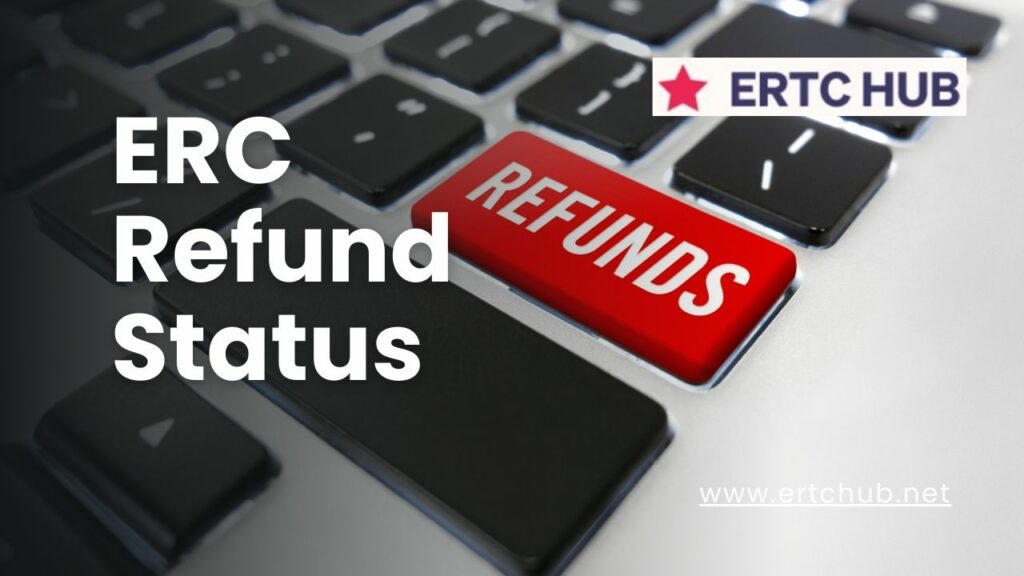Welcome to my informational post on the Employee Retention Credit aka: ERC refund status. In this article, I will provide an overview of the current situation with ERC refunds and what you can expect if you are waiting for a refund.

The IRS is facing delays in processing tax filings, including payroll tax reports, which has caused a backlog in Employee Retention Credit refund claims. These delays are a result of IRS procedures, a high volume of refund requests, and COVID-19-related service delays. To prioritize the processing, the IRS is currently focusing on handling 2020 and earlier refund requests before addressing 2021 returns.
Unfortunately, many businesses are experiencing longer wait times than anticipated for their ERC refund and are uncertain about the status of their claim. It is important to note that employers should not contact the IRS regarding the status of their refunds. Due to ongoing delays, businesses should not expect to receive their Employee Retention Credit refund anytime soon.
Previously, the IRS stated that refunds would be issued within six weeks to six months after filing, but the current turnaround time has extended to nine to twelve months. If you wish to check the status of your refund, you can call the IRS at the designated phone number, (877) 777-4778, but it is important to be prepared for long wait times as there is a shortage of operators.

I wanted to provide an update on the current status of IRS refunds, particularly in relation to the Employee Retention Credit (ERC) refund. Many businesses, like mine, are eagerly awaiting their refund and have concerns about the delays and uncertainties surrounding it. It's important to note that employers should refrain from contacting the IRS directly about the status of their refunds, as this can only further slow down the process.
The IRS is currently experiencing delays in processing various tax filings, including payroll tax reports. These delays have resulted in a backlog of ERC refund claims, causing further frustrations for businesses. It appears that the agency is prioritizing the processing of 2020 and earlier refunds before handling 2021 returns, leading to longer waiting times for businesses like mine.
The backlog in processing Employee Retention Credit refund claims has contributed to the extended turnaround time. Initially, the IRS indicated that refunds would be issued within six weeks to six months after filing. However, due to the current circumstances, the turnaround time has been extended to nine to twelve months, significantly impacting businesses' cash flow expectations.
Despite these delays, the IRS is actively working to speed up the processing of returns by reallocating resources and implementing additional measures. Unfortunately, it's uncertain when businesses can expect to receive their Employee Retention Credit refunds due to the ongoing delays caused by IRS procedures, a high volume of refund requests, and COVID-19-related service disruptions.
businesses should be prepared for continued delays and not expect to receive their Employee Retention Credit refund anytime soon. It's essential to stay informed and monitor the IRS website for any updates or changes to the refund status.
With the ongoing delays in processing tax filings and a backlog in Employee Retention Credit refund claims, many businesses are left in a state of uncertainty regarding the status of their refunds. The IRS has attributed these delays to their procedures, a high volume of refund requests, and COVID-19-related service disruptions.
Due to these circumstances, businesses should not expect to receive their Employee Retention Credit refund anytime soon. The IRS is currently prioritizing the processing of 2020 and earlier refunds before handling 2021 returns. This has resulted in extended turnaround times, with the current estimate being nine to twelve months. Furthermore, the IRS phone number provided to check refund statuses (800) 829-4933 is experiencing long hold times, which can exacerbate the frustration for businesses awaiting their refunds.
Adding to the uncertainty, businesses have expressed their frustration over the lack of information provided regarding the status of their Employee Retention Tax Credit. While the IRS has urged employers not to contact them for refund updates, businesses are left wondering when they can expect their refunds.
In efforts to speed up processing, the IRS has allocated additional resources and implemented measures to improve efficiency. However, given the magnitude of the current delays, businesses will need to exercise patience while awaiting their Employee Retention Credit refunds.

As mentioned earlier, the IRS is currently experiencing delays in processing tax filings, including payroll tax reports, which has resulted in a backlog of Employee Retention Credit (ERC) refund claims. This means that many businesses are waiting longer than expected for their refunds and are uncertain about the status of their Employee Retention Tax Credit. To check the status of your refund, you can call the IRS at (877) 777-4778. However, due to a shortage of operators, it is important to keep in mind that long wait times are expected.
When calling the IRS to request information about the status of your refund, it is advisable to be patient and prepared for the possibility of a lengthy hold time. The IRS is prioritizing the processing of 2020 and earlier refunds before handling 2021 returns, which has contributed to the extended turnaround time for ERC refunds.
It is important to note that employers are asked not to contact the IRS directly regarding the status of their refunds. The ongoing delays in processing refunds are primarily caused by IRS procedures, a high volume of refund requests, and COVID-19-related service delays. Therefore, businesses should not expect to receive their Employee Retention Credit refund anytime soon.
Due to IRS procedures, a high volume of refund requests, and COVID-19-related service delays, the Employee Retention Credit (ERC) refund process is currently experiencing significant delays. As a result, businesses should not expect to receive their ERC refund anytime soon.
Many businesses are growing increasingly impatient as they wait longer than originally anticipated for their ERC refund. Unfortunately, the IRS is struggling with processing tax filings, including payroll tax reports, which has created a backlog in refund claims for the Employee Retention Credit.
To exacerbate the situation, the IRS is prioritizing the processing of refunds for the tax year 2020 and earlier before addressing 2021 returns, further prolonging the wait for businesses.
Recognizing the urgent need to expedite the refund process, the IRS is actively reallocating resources and implementing additional measures. However, significant progress in reducing the current turnaround time is still to be seen.
In the meantime, businesses can check the status of their refund by calling the IRS at (877) 777-4778 or (800) 829-4933, although long wait times are expected due to limited operator availability.
Given the circumstances, employers are kindly requested not to contact the IRS regarding the status of their refunds. The IRS is aware of the delays and is working diligently to resolve them.
If you're eagerly waiting for your Employee Retention Credit (ERC) refund, I understand how frustrating the delays can be. However, the IRS has specifically requested employers not to contact them regarding the status of their refunds. With the high volume of refund requests and COVID-19-related service delays, the IRS is already overwhelmed.
To make matters more complicated, the IRS is currently prioritizing the processing of 2020 and earlier refunds before handling 2021 returns. This means that businesses should not expect to receive their ERC refund anytime soon due to the ongoing delays. The IRS previously stated that refunds would be issued between six weeks to six months after filing, but the current turnaround time is now nine to twelve months.
Despite the delays, rest assured that the IRS is working diligently to speed up the processing of returns. They are reallocating resources and implementing additional measures to handle the high demand. However, it is important to note that the delays in refunds are caused by IRS procedures, the unprecedented number of refund requests, and the impact of COVID-19 on service operations.
While you may be anxious about the status of your ERC refund, calling the IRS at (800) 829-4933 to check on it might not be the best option. The hold times are expected to be long due to a shortage of operators. Many businesses are waiting longer than expected for their refund and are uncertain about the status of their Employee Retention Tax Credit. It is a challenging time, but we must remain patient and wait for the IRS to work through the backlog of refund claims.
The IRS is well aware of the frustration faced by businesses awaiting their Employee Retention Credit (ERC) refunds. Delays in processing tax filings, including payroll tax reports, have caused a significant backlog in refund claims. As a result, businesses are experiencing longer-than-expected wait times, and many are uncertain about the status of their ERC refund. To address these challenges, the IRS has implemented several measures to expedite the processing of returns and alleviate the backlog.
In an effort to streamline operations, the IRS has reallocated its resources to prioritize the processing of 2020 and earlier refunds before handling 2021 returns. By focusing on older refunds first, they aim to reduce the waiting time for businesses awaiting their ERC refunds. While this approach may prolong the processing of current-year returns, it allows the IRS to address the immediate needs of businesses that have been waiting for their refunds for an extended period.
In addition to reallocating resources, the IRS has implemented additional measures to accelerate the refund process. These measures include hiring and training more operators to handle the high volume of refund requests. Despite these efforts, long wait times are still expected when contacting the IRS to inquire about the status of your refund.
While the delays in ERC refunds are undoubtedly frustrating, it's important for businesses to remain patient during this time. The IRS is actively working to speed up the processing of returns and address the backlog caused by procedural delays and the impact of COVID-19. By understanding the steps being taken to expedite the refund process, businesses can have a better understanding of the current situation and manage their expectations accordingly.
The process of obtaining an Employee Retention Credit (ERC) refund has become increasingly challenging due to various factors. The IRS is currently prioritizing the processing of 2020 and earlier refunds, causing delays for businesses awaiting their refund. Additionally, the IRS is working diligently to reallocate resources and implement additional measures to speed up the processing of returns. However, the ongoing delays have left many employers uncertain about the status of their ERC refund.
During this time, patience and understanding are essential. Businesses should refrain from contacting the IRS to inquire about the status of their refund, as this can further burden the already overworked system. The IRS has provided a phone number for individuals to check the status of their refunds, but long hold times are expected due to a shortage of operators.
It is crucial for employers to be aware that they should not anticipate receiving their ERC refund anytime soon due to the ongoing delays. The current timeframe for refunds has been extended from the initial six weeks to six months to now nine to twelve months. These delays are caused by IRS procedures, a high volume of refund requests, and the impact of COVID-19-related service delays.
In conclusion, businesses awaiting their ERC refund should remain patient and understanding throughout the refund process. The IRS is working diligently to process returns, but delays are inevitable. It is important to be aware of the challenges and adjust expectations accordingly. Remember to check the IRS website or contact the IRS directly for updates on the status of your refund.